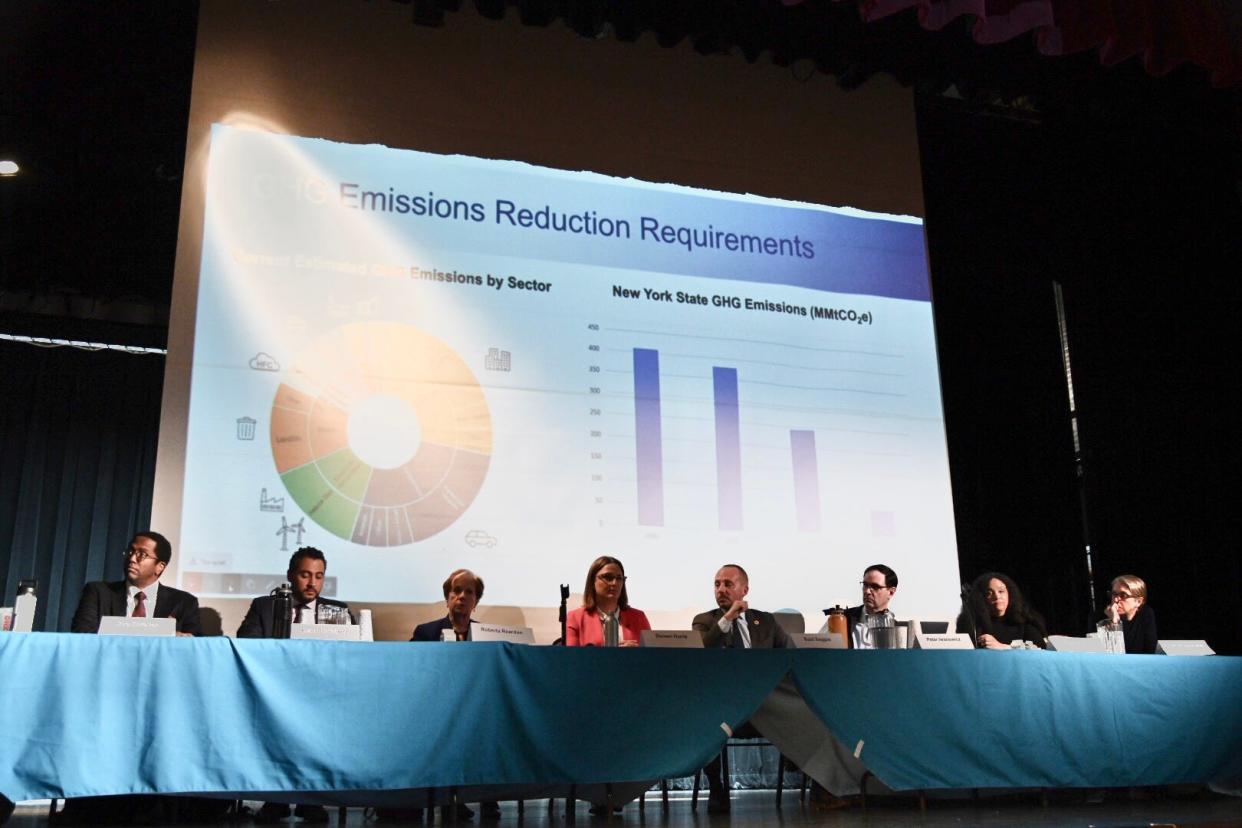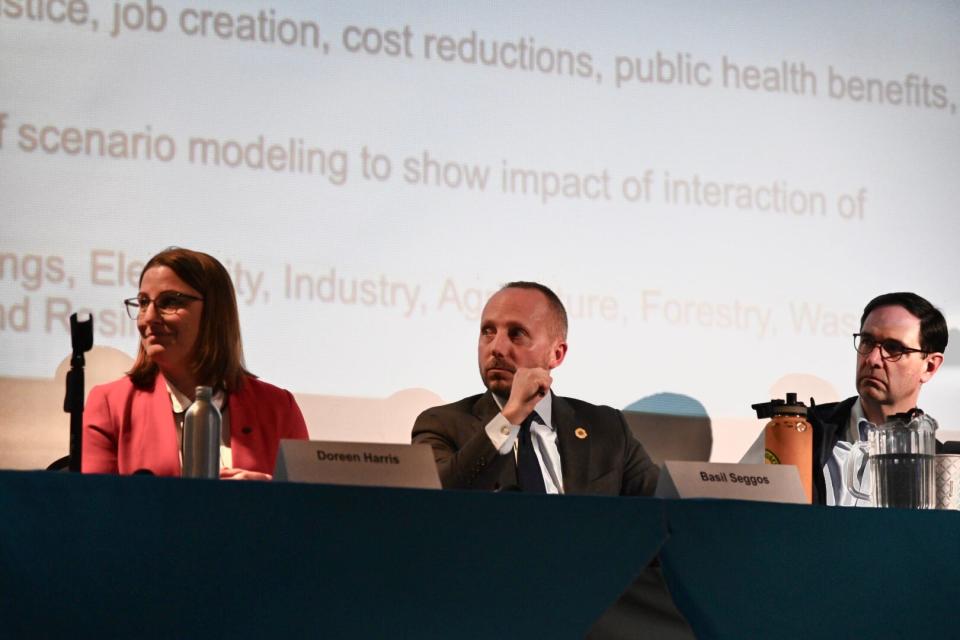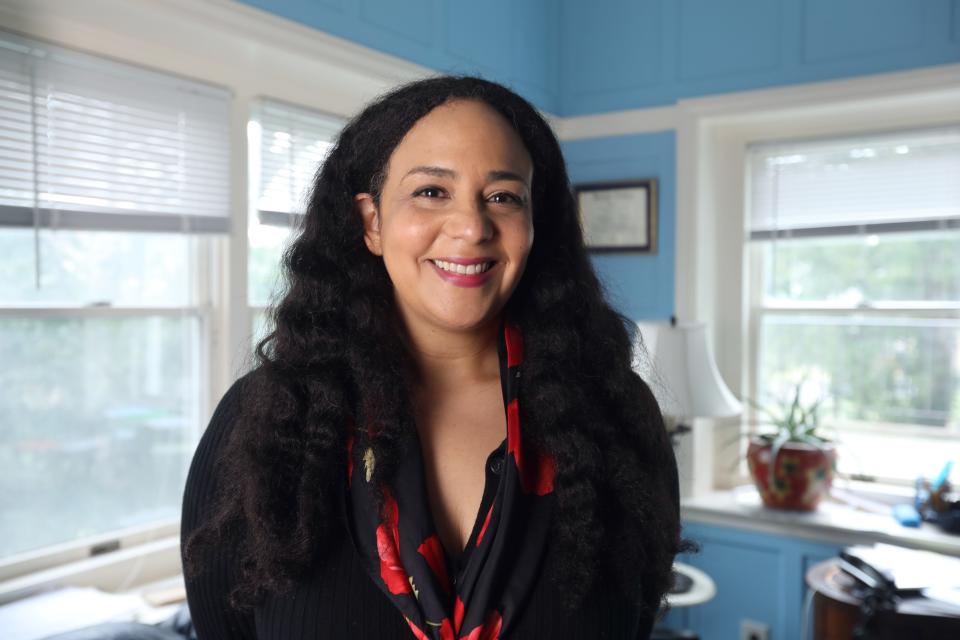Hudson Valley to get hearing for New York state's climate change plan

The Hudson Valley is set to have a public hearing for New York state’s draft plan to all but eliminate carbon emissions in the coming decades to combat the climate crisis.
On May 12, the state Climate Action Council will have a hearing at Peekskill’s Paramount Hudson Valley Theater to discuss its 300-plus-page draft scoping plan, according to Haley Viccaro, a spokesperson for the state Department of Environmental Conservation, on Thursday. The theater can seat more than 1,000 people.
By 2050, the plan aims for New York to be carbon-neutral by following goals delineated in the state's 2019 Climate Leadership and Community Protection Act, which is considered the nation's most ambitious law to address climate change.
The announced Hudson Valley hearing came after outcry for not having any events in the region, despite having some of the highest concentrations of communities identified as disadvantaged that would receive benefits of the ambitious plan. There were hearings nearby in Albany and the Bronx, but advocates worried about the distance traveled for residents.
What happens now?: Court of Appeals strikes down NY's redistricting maps
Resurrecting after disaster: Hurricane Ida destroyed their NY church. Seven months later, they returned on Easter.
Climate change goals: New York passed one of the nation's most ambitious climate laws. What will it do?

Additionally, on Wednesday, state officials announced a May 4 hearing in Peekskill, but local advocates warned of insufficient time to have supporters attend the meeting.
Viccaro said the new May 12 date "is perfect actually because it gives more notice, but it's still within our comment period as well," referring to a public comment period ending June 10.
In March, more than 500 local elected officials, nonprofits and residents signed a letter to the co-chairs of the 22-member Climate Action Council to call for a Hudson Valley hearing, as the River Newsroom, a digital magazine, first reported.
Local advocates cited that 45% of census tracts in the mid-Hudson region were defined as disadvantaged communities, according to the state's Climate Justice Working Group. This was the same as New York City, they wrote.
Jen Metzger, a senior policy advisor to the advocacy group New Yorkers for Clean Power and a former Hudson Valley state senator who co-sponsored the 2019 climate law, pointed to the percentage of disadvantaged communities in the region, as well as the rural nature of the Hudson Valley.
“It's going to affect communities all up and down the Hudson," she said. "Our farms really are on the front lines of climate change in terms of experiencing the direct impacts. We have a lot at stake."
The plan aims, by 2050, to cut carbon emissions in the state by at least 85% below 1990 levels, as outlined in the 2019 climate law. The remaining emissions would be offset by carbon sequestration, such as forestation.
To achieve the decades-long goals, the state must hit designated benchmarks, according to the 2019 climate law. These include:
by 2025, 6,000 megawatts of distributed solar energy, and 185 trillion British thermal units in on-site energy savings;
by 2030, 70% renewable energy storage, including 3,000 megawatts of energy storage, and a 40% reduction in emissions;
by 2035, 9,000 megawatts of offshore wind;
by 2040, 100% zero-emissions electricity.
The plan is expected to be costly. With three main scenarios, the draft scoping plan is estimated to be upwards of $290 billion.
But, the plan outlines, it will benefit the state between $90 to $120 billion, and it could add 10 jobs for every job lost. Inaction could cost $90 billion.
It indicates the scenario for strategically using low-carbon fuel — such as bioenergy — would cost the most, $310 billion, and have the least net benefit. Meanwhile, the plan's $290 billion option for an accelerated transition from fossil fuel combustion would have the largest net benefit.
The 2019 climate law establishes that the transition ensure equity goals to low-income communities and communities of color considered disadvantaged. In doing so, at least 35%, with a goal of 40%, of benefits of spending from the plan must go to these communities.

In the Hudson Valley, this can mean job creation in renewable energy sectors and sequestration of remaining emissions, Metzger said, including through forestation and agriculture.
But it also has public health implications with reduced fossil fuel combustion in communities such as Newburgh, which has one of the highest asthma rates in New York and emergency room visits that more than double the state average, according to state health data.
Raya Salter, a New Rochelle-based environmental attorney who sits on the Climate Action Council, also joined in pushing for a Hudson Valley hearing, but she worried about the population center of Westchester in the county's south that won’t have a hearing.
The council’s first hearing for the draft plan was April 5 at Bronx Community College — still a schlep for lower Westchester residents in communities in Yonkers, Mount Vernon and New Rochelle, cities that have census tracts identified as disadvantage communities.
“I’m glad to hear it,” Salter said of the Peekskill hearing. “But we’ve got a big population in southern Westchester.”
The public comment period for the draft plan ends June 10. By the end of the year, the Climate Action Council will convene to finalize its plan.
For more information, visit https://climate.ny.gov/CAC-Meetings-and-Materials. Here are the remaining hearings:
Brooklyn: New York City College of Technology, The Theater at City Tech, Tuesday, May 3, 4 p.m.
Virtual: https://nyserdany.webex.com/nyserdany/onstage/g.php?MTID=e3f037513c7ab055c46f1253fb908265e, Saturday, May 7, 10 a.m.
Tupper Lake: The Wild Center, Tuesday, May 10, 4 p.m.
Virtual: https://nyserdany.webex.com/nyserdany/onstage/g.php?MTID=eecfcf639bf8b5c07f1740e976f494fba, Wednesday, May 11, 4 p.m.
Peekskill: Paramount Hudson Valley Theater, Thursday, May 12, 4 p.m.
Eduardo Cuevas covers diversity, equity and inclusion in Westchester and Rockland counties. He can be reached at EMCuevas1@lohud.com and followed on Twitter @eduardomcuevas.
This article originally appeared on Rockland/Westchester Journal News: Hudson Valley to get hearing for New York's climate change plan

